There are a lot of ways to learn new things, but little beats putting your questions to the expert and finding out the latest science, straight from the source, which is why we’re running an event to do just that – I’m a Geoscientist, Get me out of here! James Hickey, a volcanologist from the University of Bristol, tells us why he put himself in the firing line and entered a similar competition (I’m a Scientist, Get me out of here!) to use his quick wit and scientific know-how to tackle questions from an army of eager, enquiring school children…
I’m a Geoscientist follows the same format as I’m a Scientist. For those not in the know, what is it?
I’m a Scientist, Get me out of here! (IAS) is an online event pitting the creative minds of school kids against scientists brave enough to answer their questions. The students test the scientists over fast-paced online live chats as well as uploading questions to be answered when time allows. They then judge the scientists and vote for their favourite. Think of an X-Factor-Academia mash-up, leaving the winner with £500 to further communicate their science to the public.
Looking back now, 5 months on, I’ve been able to reflect from a more removed perspective, whilst still keeping an eye on the current goings on (the latest I’m a Scientist event finished last month, and I can only imagine what sort of “how does a plane disappear?” questions might have arisen!).
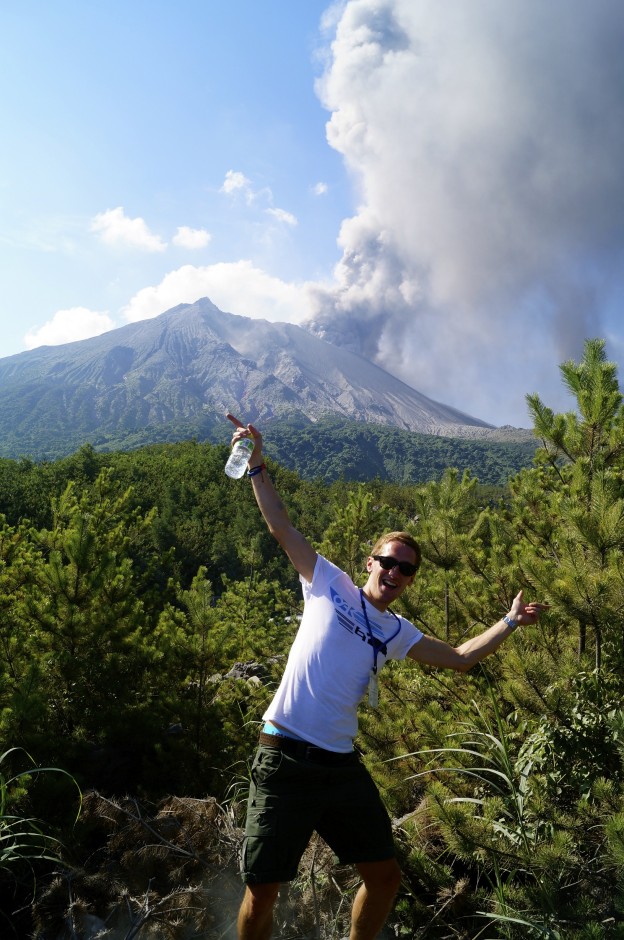
Enjoying a Vulcanian explosion at Sakurajima volcano during the IAVCEI conference. (Credit: James Hickey)
What made you throw your hard hat into the ring?
It was my enjoyment of outreach events that primarily got me interested in IAS. Kids and adults alike get a little excited when they first ask what I do for a living – I study volcanoes! Translating this initial excitement into a simple scientific understating is a challenge I cherish, not only because I love to talk about the work I do. IAS seemed like the perfect platform for me to explore this further, in a medium that has become second nature to most kids (even if my typing speed wasn’t quite up to scratch!).
What sort of questions spring from the mind of a school kid?
“Why do volcanoes erupt?”, “what caused the typhoon in the Philippines?”, “why do earthquakes occur?” – these are just a minute fraction of the Earth science questions I was asked. There were also a lot of non-Earth science questions: “why do pregnant women get cravings?”, “do you think there are other life forms in space?”, and “how much does a scientist get paid?”, for example. I always thought I had a pretty broad science knowledge base but this event proved me otherwise. I had an awesome time though, and it was all very exciting – as I explained in a blog post shortly after the event.
What were the highlights?
True to expectations, it was almost exactly what I was hoping for, but better! School kids from different classes across England were throwing questions at me and my competitors from topics that were impressively diverse. Answering those questions and satisfying their curiosities was perhaps one of the most rewarding parts of being involved.
The incredibly hectic live chat sessions were by far my favourite though. An entire class of school kids versus a handful of scientists (or in some cases, just me!) in real-time. The questions came faster than I could read, let alone reply to, and on entirely unrelated topics. But once you get over they mayhem and start to build up some speed with the answers (I did shout across the office for help on some occasions…) you can really begin to enjoy it. Particularly when you develop a conversation and witness how the kids build on the answers you give to ask new questions.
I also had the opportunity to share the experiences I’ve had doing my undergraduate and PhD studies (the fieldwork stories were especially well received.). The students seemed quite surprised that a ‘science’ career could take you to volcanoes around the world instead of a laboratory basement! These more personal questions were important for the kids to know that scientists are real people, with real lives. I spent a fair amount of time discussing the comparison of Cristiano Ronaldo, Lionel Messi and Gareth Bale for example, much to the annoyance of the IAS moderator who was trying to keep things on a science track (sorry!).
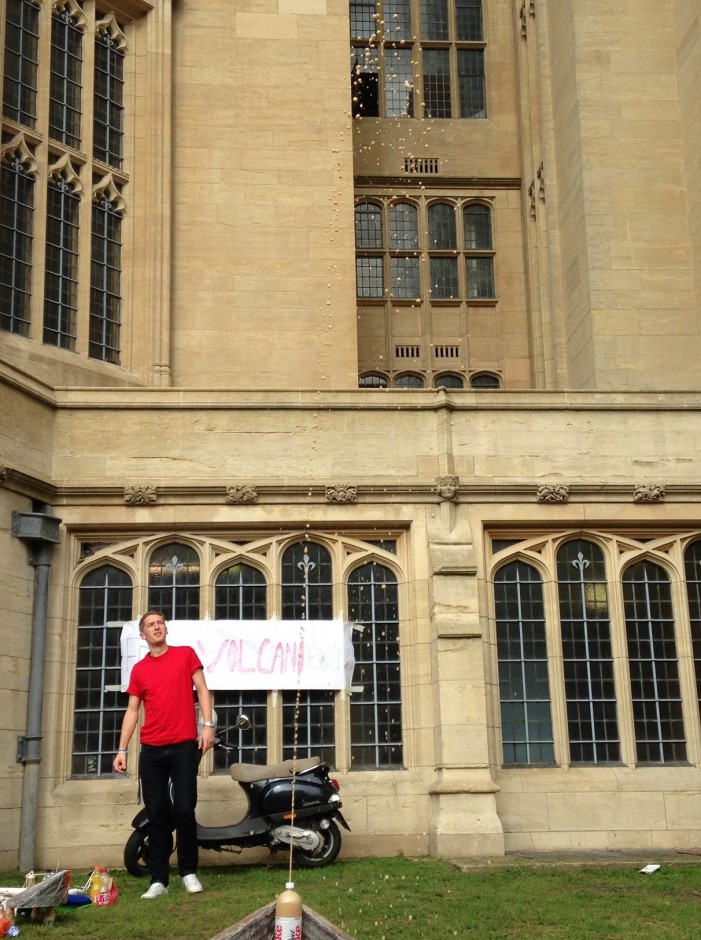
Exploding some Diet Coke with mint Mentos during a volcanology outreach event at the University of Bristol. (Credit: James Hickey)
And finally, the future. What’s next?
Having won the event I now find myself with a £500 cheque to dedicate to further volcanology outreach. A combination of fieldwork, conferences, workshops and paper-writing have conspired against me so far but my plans are coming together. Inspired by the success of the question-answer format of the IAS event, and knowing how youngsters are becoming increasingly internet and tech-savvy, my plan is to develop an interactive volcanology website for kids worldwide. With exciting videos, simple schematic diagrams and the chance to upload questions for volcanologists to answer I hope to satisfy curious minds for years to come.
I will also be keeping a very close eye on the inaugural, I’m a Geoscientist, Get me out of here! event, which promises to be particularly exciting. I’ve grudgingly resisted the temptation to apply and throw myself back into the firing line, but best of luck to all those who take part. The rewards are worth it so I urge you to give it your all.
Curious? Tune in to the first ever I’m a Geoscientist event in June!

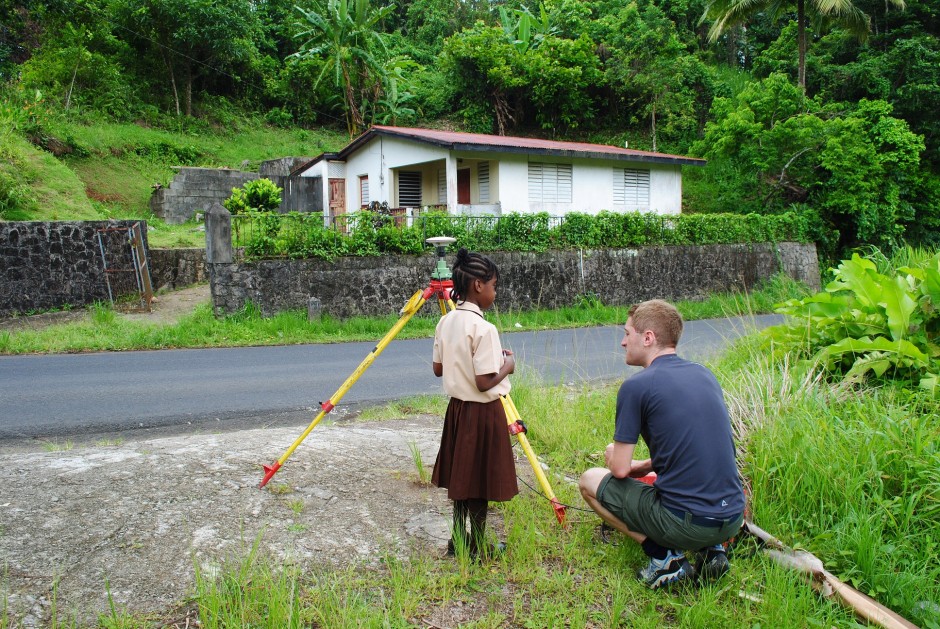
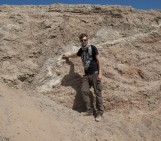
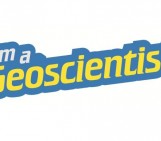
Pingback: Wordpress Blogs - Wordpress Blogs .NET